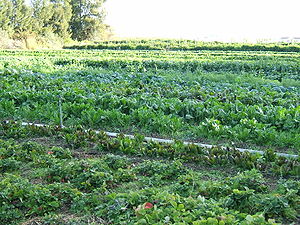Certifiedsfa leaf |
| Certified - Farm, Food, Certification, Organic and Natural Products |
| Certified - Farms, Foods, Certifications, Organic and Natural Products |
Farm Certified : Organic vs Conventional -

|
| Certification - Organic certification, particularly where mandated by law, as in the US and the EU, is increasingly being seen by individual organic farmers and consumers as a contentious issue. |
| Where the push for regulation was originally a grassroots effort by organic producers and buyers looking to uphold standards and prevent fraud, the complex regulations and opportunities for loopholes that have emerged have lead to charges being levelled against major certifiers and government programs. |
| In the US, where standards became law in 2002, serious complaints have been lodged with the USDA against the largest US certifying agency, and the USDA itself has been taken to court, based on such challenges. |
| The label 'organic certified' is a standard for labeling used to hold for the growers more concerned with quality, and consumers more concerned with nutrition. |
| Concern about the "watering down" of standards to facilitate large-scale production is currently a significant aspect of organic farming regulation. |
| A leading US proponent of organic farming, Eliot Coleman, who served as an adviser to the USDA during the drafting of the original organic guidelines in the US in the 1980s, and served a term as Director of IFOAM |
| Four Season Farm Certification Authentic Food |
Organic certification |
| Organic certification for formal and legal definitions
Definitions of organic food vary. Organics can be difficult to explain by empirical measurement. For one thing, most food industry research of the last 50 years has focused on developing chemical agriculture and modern food processing -- less has been done to investigate side effects of conventional agriculture that are not obvious. Also, organics is concerned in large part with what NOT to do - "as much as possible, let Nature do its thing" -- rather than in devising precise formulas for organic production. A strictly rules-based definition of organic farming and organic food, consisting of approved inputs and practices, created and maintained by regulatory agencies, is inevitably subject to "exceptions" and to special interest pressures to modify the rules. As organics become "whatever the rules say it is", the line between organic and conventional food can get blurred. Early organic consumers looked for chemical-free, fresh or minimally processed food, and they had to buy directly from growers: Know your farmer, know your food . Organic food at first comprised mainly fresh vegetables. Personal definitions of what constituted "organic" could be developed through first-hand experience: talking to farmers and seeing farm conditions and farming activities. Small farms could grow vegetables (and raise livestock) using organic farming practices, with or without certification, and this was more or less something the individual consumer could monitor. As consumer demand for organic foods continues to increase, high volume sales through mass outlets, typically supermarkets, is rapidly replacing the direct farmer connection. For supermarket consumers, food production is not easily observable, and product labelling, like "certified organic", is relied on. Government regulations and third-party inspectors are looked to for assurance. With widespread distribution of organic food, processed food has also become dominant over fresh, confusing the issue further. Modern food processing is complicated. Commercial preparation methods, the use of additives, the effects of packaging and storage, for instance, are outside the first-hand experience of most people, including organic farmers. Traditional, minimally processed products, baked goods; and canned, frozen, and pickled fruits and vegetables, are easier for consumers to understand by comparison with home preparation methods, although home and mass-production techniques are quite different. For convenience foods, like frozen prepared foods and cooked breakfast cereals, ingredients and methods are quite a mystery to most consumers. A "certified organic" label is usually the only way for consumers to know that a processed product is "organic". |
| Farm Methods Organic and Conventional |
| Certified |
| Transgenic |
| Farm History |
| Farms |